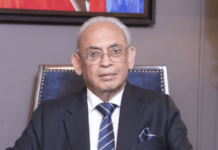Prakash Jha Productions and Play Entertainment’s Jai Gangaajal (UA) is the story of corrupt politicians whose word is the law of the land and how an honest lady police officer ultimately puts an end to their rule.
Lakhisaria is a very small town in Bankipur district. The local MLA, Babloo Pandey (Manav Kaul), and the minister, Ramakant Chowdhary (Kiran Karmarkar), are so powerful that they can get away with just about anything. Chowdhary has dreams of becoming the chief minister in the ensuing elections. The poor people of the town sell their agricultural produce in the huge market place but this big plot of land is now being purchased by an industrialist, Samanta. Babloo Pandey’s brother, Dabloo Pandey (Ninad Kamath), has been forcing the farmers to accept whatever compensation Samanta is offering them but there are a few who are unwilling to sell their plots of land. Minister Chowdhary also has a lot to gain from this transfer of land.
Except for the SP, the other police officers are all paid stooges of the Pandeys and, therefore, the farmers find themselves at the mercy of the Pandey brothers. B.N. Singh (Prakash Jha) is one such corrupt police officer who is very close to the Pandey brothers. The honest SP is soon transferred when he starts becoming a threat to the Pandeys.
In place of the outgoing SP comes a lady SP, Abha Mathur (Priyanka Chopra). Minister Chowdhary has her appointed the SP of Bankipur because he is under the belief that since she and her family are obliged towards him for favours done in the past, she would never go against his wishes and would, therefore, let the Pandeys and him carry on with their illegal activities.
But Abha Mathur is made of sterner stuff. An extremely principled police officer, she starts getting the corrupt politicians and their family members and men to book. She even warns B.N. Singh to mend his ways but often finds herself helpless when she sees the rot that has set in in her subordinates.
Slowly but surely, the people of Bankipur start to see a ray of hope in Abha Mathur. But the kidnap and rape of Sunita (Vega Tamotia), a young girl who refused to sell her plot of land, at the hands of Dabloo Pandey, and her ultimate suicide shakes the people of Bankipur. It also awakens the conscience of B.N. Singh because somewhere, he feels responsible for her death. With the parents already being dead, there’s only the school-going Nagesh (master Ayush Mahesh Khedekar), brother of Sunita, who is left in the family, to fend for himself. The little boy seeks revenge at the first opportunity by publicly lynching and killing Dabloo Pandey after he is beaten black and blue by B.N. Singh who has now turned over a new leaf.
The people of Bankipur muster courage and kill a few more people working for Babloo Pandey. But, with the help of B.N. Singh and other police officers present at the place where the public lynching happens, the murders are projected as suicides so that nobody gets into trouble. B.N. Singh now hides little Nagesh as he fears for his life.
Abha Mathur is aware that the suicides are actually cold-blooded murders but she is unable to book anybody for them. However, soon, B.N. Singh takes responsibility for the same. Meanwhile, Babloo Pandey, aware that little Nagesh had killed his brother, Dabloo, is baying for his blood.
Does Babloo Pandey track down Nagesh and avenge the murder of his brother? Or do Abha Mathur and B.N. Singh bring Babloo Pandey to book?
Prakash Jha’s story is oft-repeated and focusses too much on B.N. Singh instead of Abha Mathur, making it seem as if B.N. Singh is the hero of the drama although the build-up is to project Abha Mathur as the hero. There are two major inherent drawbacks in this – firstly, B.N. Singh’s character is played by Prakash Jha who is a first-time actor and hence has no fan following to carry off such a lengthy role of a hero; secondly, Prakash Jha is well into his sixties and for the audience to accept a debut-making actor of that age as a hero seems unlikely. Even otherwise, Jha’s story gets repetitive after a point of time and fails to involve the audience if only because it does not have even a hint of novelty. Why a corrupt-to-the-core B.N. Singh has a sudden change of heart has not been clearly established and, therefore, does not have even half the desired impact on the audience.
Prakash Jha’s screenplay is clichéd, to say the least. It moves forward without giving the viewers much of a high. Although the build-up of Abha Mathur’s character gives the audience the impression that she is the real hero of the drama – and this impression is also because she is the most saleable name in the cast – the unfolding drama presents B.N. Singh as the hero, something which the audience is absolutely unprepared for because it is least expected and also because B.N. Singh is too old to pass off as a hero, not to speak of the fact that the character is played by a rank newcomer, Prakash Jha.
Further, the screenplay keeps reminding the viewer of similar films made in the past, more so, Singham. Having said that, it must be added that the film looks like a very poor cousin of Singham, because it does not have the highs of Singham. Even the climax belongs more to B.N. Singh than Abha Mathur, giving the audience the feeling of having been taken for a ride. The clap-traps one associates with heroic acts are almost missing and for a film about exposing corruption and the corrupt, that’s a big minus point.
Prakash Jha’s dialogues are very good at places but lack the sting at other places.
Priyanka Chopra does a fair job as Abha Mathur. The need of the character was a firebrand performance but that does not come from Priyanka. Not only is her acting less than what was needed but she also gets limited scope to act because of the lopsided script. Prakash Jha acts well as the unscrupulous B.N. Singh who finally has a change of heart, but the audience’s acceptance of the debut-making actor in such a lengthy role is unthinkable! Jha giving his character the maximum prominence and footage is the biggest blunder even though his acting is good. Manav Kaul acts ably as MLA Babloo Pandey but does go overboard in a couple of dramatic scenes. Ninad Kamath is very effective as Dabloo Pandey. Murali Sharma leaves a mark in the effeminate character of Munna Mardani. Kiran Karmarkar plays the polished villain, Ramakant Chowdhary, with conviction. Vega Tamotia is quite nice as Sunita. Rahul Bhatt, in a special appearance as Pawan Raghav, leaves a mark but he comes and goes as per the convenience of the script writer. Shakti Kumar (as DSP Prabhu Narayan), Jagat Singh Solanki (as Amreek Tiwari) and master Ayush Mahesh Khedekar (as Nagesh) lend fair support. Vijay Kumar (as farmer Deenu), Pradeep Kukreja (as industrialist Samanta), Vinod Nahdih (as mukhiya), Ravi Khandwailkar (as mahasarpanch), Indraneel Bhattacharya (as IG Mithilesh Kumar), Mikhail Yawalkar (as SP Naveen Chandra), Sushant Mishra (as Pappu), Karuna Verma (as B.N. Singh’s wife), Salone Mehta (as Abha Mathur’s mother), Ankush Bali (as Moti Pahelwan), Pranay Narayan (as Ratnakar) and Queen Harish (as the dancer in drag) are alright.
Prakash Jha’s direction is reasonably good but his unexciting script will not find too many takers, especially in the multiplexes. Salim-Sulaiman’s music is more functional than anything else. The first song is well-tuned. Lyrics (Manoj Muntashir; one song by Prakash Jha) are in keeping with the film’s mood. Rajit Dev’s choreography is so-so. Salim-Sulaiman’s background music is routine. Sachin Krishn’s camerawork is good. Sham Kaushal’s action scenes afford excitement. Udai Prakash Singh’s production design is appropriate. Santosh Mandal’s editing is alright.
On the whole, Jai Gangaajal is a dull and unexciting film with an oft-repeated subject and one which gives the audience the feeling of having been cheated because it revolves around Prakash Jha instead of Priyanka Chopra. It will face rejection from the public and will, therefore, entail heavy losses to the investors.




























